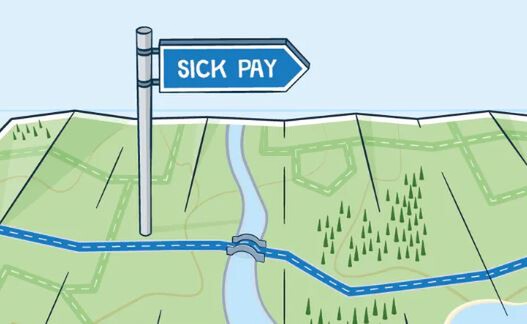SSP Remains an Issue for Employers Who Have Employees Who Are Sick or in Self-isolation.
Ian Holloway has reported on Accounting Web that SSP has largely been overshadowed by announcements about retaining employees, furloughing and then reclaiming wage costs from HMRC. However, the issue of SSP has been continued in the background.
It was announced that The Coronavirus Act 2020 would make provision to temporarily allow SSP to be paid from the first day of sickness absence, rather than the fourth day. But, this only applies for people who had been told to self-isolate, and for people caring for those in the same household who display COVID-19 symptoms and have been told to self-isolate.
Whilst the Coronavirus Act 2020 may have allowed this change to happen, secondary legislation in the form of regulations are required to make those changes effective in practice. Two sets of regulations (for Great Britain and Northern Ireland) opened up the SSP system to employees isolating themselves from others in accordance with advice on coronavirus disease and, therefore, deemed to be incapable of work. This advice came from Public Health England, NHS National Services Scotland, Public Health Wales, or the Regional Agency for Public Health and Social Well-being in Northern Ireland on 12 March 2020):
- The Statutory Sick Pay (General) (Coronavirus Amendment) Regulations 2020
- The Statutory Sick Pay (General) (Coronavirus Amendment) Regulations (Northern Ireland) 2020
Both of these regulations came into force on 13 March 2020. These regulations have not fundamentally changed the workings of SSP. There will still be a requirement to form a period of incapacity for work, the only thing that the new legislation does is open up the SSP system to more people as well as smaller employers may be able to recover the first 14 days of SSP that is COVID-19 related from HMRC.
The two further sets of regulations amend the effective date of the guidance from the relevant health advisory bodies in each of the UK nations, from 12 March 2020 to 16 March 2020. The reason for the change is that the guidance on 16 March 2020 changed the self-isolation advice from 7 days to 14 days in some cases. They only amend the legislation for employees isolating themselves:
- The Statutory Sick Pay (General) (Coronavirus Amendment) (No 2) Regulations 2020
- The Statutory Sick Pay (General) (Coronavirus Amendment) (No. 2) Regulations (Northern Ireland) 2020
The Great British legislation came into force on 17 March 2020 whilst the Northern Irish legislation came into force on 19 March 2020.
More regulations open up the SSP system to employees shielding themselves from others in accordance with ‘public heath guidance’, as amended from time to time, issued by Public Health England, Scottish Ministers, Public Health Wales National Health Service Trust or the Regional Agency for Public Health and Social Well Being in Northern Ireland:
- The Statutory Sick Pay (General) (Coronavirus Amendment) (No. 3) Regulations 2020
- The Statutory Sick Pay (General) (Coronavirus Amendment) (No. 3) Regulations (Northern Ireland) 2020
So, as a result of the three new sets of regulations, we know that SSP is payable to people that are self-isolating or shielding.
Aside from the SSP Regulations 1982, it is the Social Security Contributions and Benefits Act 1992 (section 155) and the Social Security Contributions and Benefits (Northern Ireland) Act 1992 (section 151) that both say: “Statutory sick pay shall not be payable for the first three qualifying days in any period of entitlement.”
Therefore, if SSP is to be payable from the first day of COVID-19 related sickness absence (actual sickness, self-isolation or shielding) rather than from the fourth day, these two pieces of legislation need amending:
- The Statutory Sick Pay (Coronavirus) (Suspension of Waiting Days and General Amendment) Regulations 2020
- The Statutory Sick Pay (Coronavirus) (Suspension of Waiting Days and General Amendment) Regulations (Northern Ireland) 2020
The purpose of both of these regulations is to say that the three waiting days do not apply where the sickness/absence is COVID-19 related and the first day of that sickness/absence is on or after 13 March 2020.
Also, both pieces of legislation omit the expiry date meaning that the legislation changes no longer cease to have effect eight months following 13 March 2020.
As at 22 April 2020 employers are able to pay SSP to a wider range of people, and the three waiting days have been suspended (for COVID-19 related sickness, self-isolation or shielding). This does not mean that any other SSP rules have been replaced or repealed.
The promise that employers will be able to reclaim the first 14 days of COVID-19 related SSP has not manifested itself into legal reality. The government guidance still says, “The online service you’ll use to reclaim SSP is not available yet. HMRC will announce when the service is available and this guidance will be updated.”
However, there is some useful information in that guidance such as:
- Employers must have set up a PAYE scheme by 28 February 2020 and have started to use it
- In order to make a reclaim for SSP the employer must have less than 250 employees on the payroll at 28 February 2020
Useful sites:
Work out your employee's Statutory Sick Pay here.
Calculate your employee's Statutory Sick Pay here.

